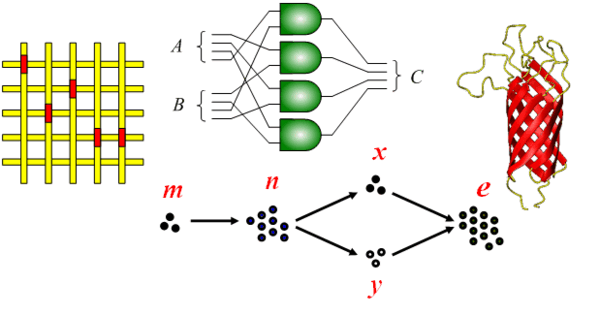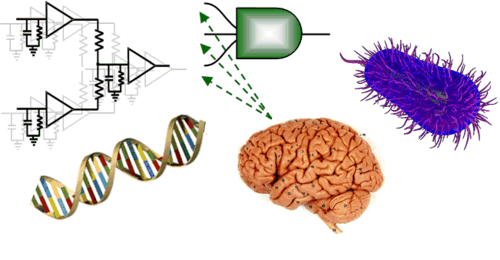Main Page
From The Circuits and Biology Lab at UMN
A collaborative website for the Circuits and Biology group.
About the Group
The group consists of Prof. Marc Riedel and his students in the Department of Electrical and Computer Engineering at the University of Minnesota. Our research activities encompass topics in logic synthesis and verification, as well as in synthetic and computational biology. A broad theme is the application of expertise from digital circuit design to new areas.
- See our "People" page for a list of everyone in the group.
- See our "Research" page for an overview of our research activities.
- See our "Publications" page for our papers, theses, proposals, and slides.
- See our "Tools" page for software tools that we have developed.
- See our "Teaching" page for courses that Marc teaches.
Announcements
- Marc was named Oracle Research Fellow.
- We received a $200,000 grant from Oracle for Research.
- We received a $118,000 grant from Seagate on DNA storage.
- We received a $200,000 NSF Grant for computational work on COVID 19.
- Our paper Computation of Mathematical Functions using DNA via Fractional via Fractional Coding has appeared in Nature Scientific Reports.
- With colleagues from the University of Illinois and the University of Texas, we have received a $1.8 million grant from the DARPA Molecular Informatics Program to pursue research on DNA Storage.
- M. Hassan Najafi graduated and has accepted a tenure-track position at the University of Louisiana.
- Ahmad Salehi graduated and has accepted a tenure-track position at the University of Kentucky.
- Our paper on Polysynchronous Clocking was the IEEE Transaction on Computers "Feature Paper of the Month."
- Our work on A Deterministic Approach to Stochastic Computing has received critical acclaim: it upends the conventional thinking on stochastic computing (a field that we pioneered back in 2008).
- Ahmad received the Doctoral Dissertation Fellowship, a prestigious university-wide award for top doctoral candidates at the University of Minnesota.
- We received two NSF Grants in 2014:
- Back to the Future with Printed, Flexible Electronics –Design in a Post-CMOS Era when Transistor Counts Matter Again
($800,000 joint with Kia Bazargan, Ramesh Harjani, David Lilja, and Dan Frisbie) - Advanced Signal Processing with DNA
($300,000 joint with Keshab Parhi)
- Back to the Future with Printed, Flexible Electronics –Design in a Post-CMOS Era when Transistor Counts Matter Again
- John has earned his Ph.D. He joined Rockwell Collins in April, 2013
- Mustafa has earned his Ph.D. He joined the Istanbul Technical University as an Assistant Professor in September, 2012.
- Hua has earned his Ph.D. He joined Synopsys in June, 2012.
- The Board of Regents of the University of Minnesota has conferred indefinite tenure on Marc in May, 2012.
- John received the Doctoral Dissertation Fellowship, a prestigious university-wide award for top doctoral candidates at the University of Minnesota, in May, 2012.
- Our group received a $400,000 grant from the NSF Computing and Communications Foundations Program in May, 2012.
- Weikang has earned his Ph.D. He joined the University of Michigan–Shanghai Jiao Tong University Joint Institute as an Assistant Professor in September 2011.
- Weikang received the Doctoral Dissertation Fellowship, a prestigious university-wide award for top doctoral candidates, in May, 2010.
- Our group received a $200,000 grant from the NSF Computing and Communications Foundations Program in June, 2009.
- Our group received a $500,000 grant with the NSF CAREER Award, in June, 2009.
- Marc received a NSF CAREER Award, the National Science Foundation's most prestigious award in support of junior faculty, in June, 2009.
- Our group received a $325,000 grant from the Center on Functional Engineered Nano Architectonics (FENA), a joint Semiconductor Research Corporation (SRC)/Department of Defense research center, in August, 2006.

